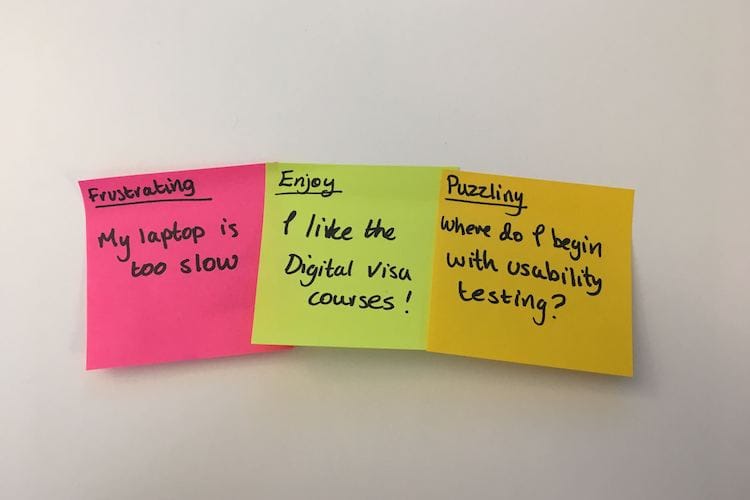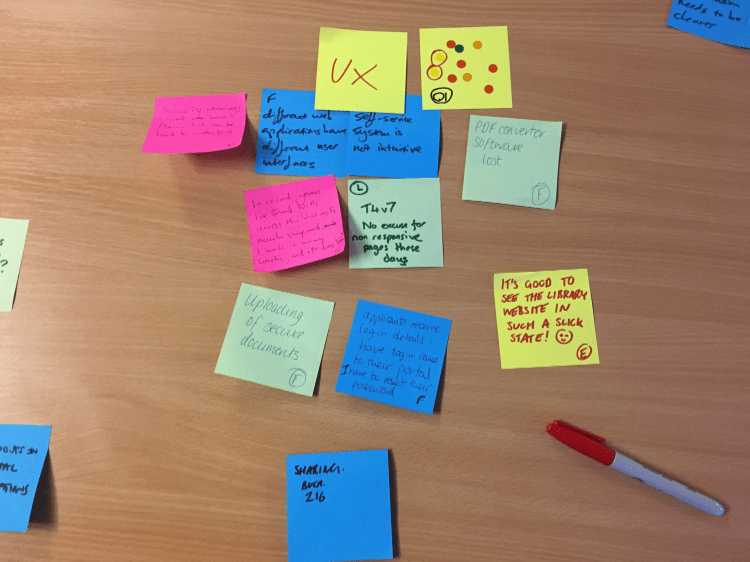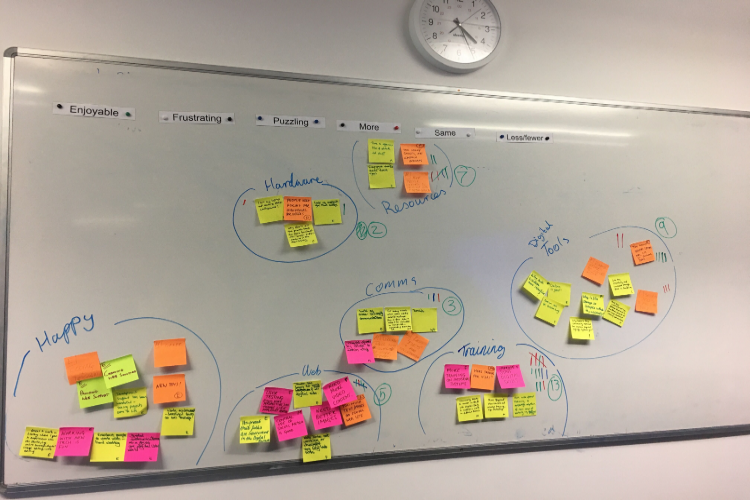The digital retrospective summary
On Wednesday 27 February the digital communications team hosted the first Digital Forum. The aim of the session was to gain an understanding about how colleagues experience digital services and technology on a daily basis throughout the University. This post covers what happened at the forum, and some initial findings from the retrospective.
We set out to achieve this by evaluating our own experiences with digital processes through a retrospective. This is a meeting where participants provide suggestions and feedback individually, then come together as a group to discuss key findings and create actions to solve problems.
In a retrospective everyone is on the same level. Without judgement, we’re all given the opportunity to express our ideas, concerns and what we’re enjoying. Often, a problem is highlighted that is affecting the team as a whole, which can subsequently can be fixed.
Before diving straight into the retrospective, I provided some background as to what exactly a retrospective is and the benefits of conducting regular retrospectives. For example, retrospectives can:
- provide clarity on what’s working (and what isn’t)
- improve team morale
- help solve simple and complex problems
- celebrate achievements and working processes that could go unnoticed.
Agree to the ground rules
To officially start the retrospective, all attendees agreed to the ground rules and prime directive. These help set boundaries for the session, as well as help focus those involved on the task at hand. We all agreed to the following:
- We will be honest.
- We will accept everyone’s opinion without judgment.
- We will try to not interrupt.
- We will talk from our own perspective, and not speak for anyone else.
- We will not make jokes about other people in the room.
- We will not check mobile phones, email, etc during the retrospective.
In addition to these rules, we also included Norm Kerth’s prime directive, a staple of agile retrospectives.
“Regardless of what we discover, we understand and truly believe that everyone did the best job they could, given what they knew at the time, their skills and abilities, the resources available, and the situation at hand.”
Norm Kerth’s prime directive, The Art of Agile Development
The purpose of the prime directive is to help ensure that teams have the right culture of openness and honesty. After I read out the prime directive, we all collectively said “I agree” out loud. Verbally agreeing with the directive is perhaps not 100% necessary for a retrospective, but it’s thought that if someone speaks early in a meeting, hearing their own voice in that context, then they are more likely to contribute again during the meeting.
Contributing ideas
After we had all agreed to the rules, the attendees had ten minutes to consolidate their thoughts on their experience of digital technologies at the University. As a starting point, attendees were asked: “What does your digital landscape at the University look like, and how does it function?”
At this stage in the retrospective users worked individually and categorised their ideas as into the following categories:
- Enjoyable
- Frustrating
- Less
- More
- Same
Once all the post-its were up, a spokesperson from each group read out all post-its to their group. This is a key step in the process and allowed all participants to hear other peoples’ opinions and feedback.
Categorisation and voting
This was the group-work element of the retrospective, where all members of each team came together and silently (or as quietly as possible) organised the post-its into relevant categories. For example: “software”, “meetings”, “email”, “workload”, “admin”, etc.
Seeing the post-its grouped was a satisfying moment in the teams as it showed that despite the fact that attendees were from different departments, their ideas overlapped enough for clear and defined groupings.
Attendees were then given five votes each and were told to individually vote on the categories that were most important to them. They were told that the categories that received the most votes would be looked at more closely, and discussed further with all attendees.
Findings
After consolidating all of the post-its it was evident that there were some clear categories that people felt should be discussed further. The categories and some examples of the post-its within them can be found below:
- Communication
“Newsletter very helpful” (Same)
“People phone or email instead of using Unidesk” (Frustrating)
“Lack of cross-University communications” (Frustrating) - Digital skills and training
“Team too busy to work more on digital side” (Frustrating)
“More widespread training to encourage adoption of new ways of working (eg. Skype Meetings)” (More)
“More knowledge transfer – improve own understanding of processes and tools.” (More) - File management
“More time to organise files and delete old stuff” (More)
“OneDrive is great” (Enjoyable)
“Why is file storage so complex within the University?” (Puzzling).
In addition to these themes, it was encouraging to see that both teams had a ‘happy’ category. One of the key elements to a retrospective is acknowledging that while there are issues and problems to fix, there’s also a lot to like about the way we work sometimes.
March Digital Forum
The next Digital Forum will be taking place on Wednesday 27 March at 3pm in classroom 216 in the Buchanan building. In the March Digital Forum we will analyse and discuss the outcomes of the retrospective to identify themes for future Digital Forums.
If you have an idea, topic, workshop or discussion point which could work at the Digital Forum, please let the digital communications team know. In addition, if you are interested in running a workshop or leading a discussion on a digital subject please also let us know! Contact [email protected].


